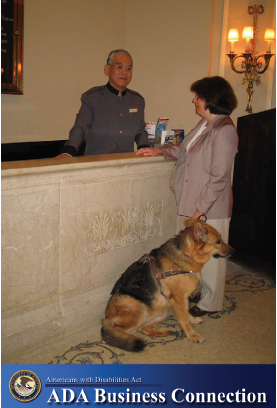Expanding Your Market: Accessible Customer Service Practices for Hotel and Lodging Guests with Disabilities
The Market of Travelers Who Benefit from Accessibility

The hospitality industry prides itself on giving its customers a warm welcome and providing outstanding service in pursuit of high guest retention and consumer satisfaction. By extending that same level of customer service to guests who have disabilities, hotels and lodging establishments can build a clientele in a growing, diverse market that remains as yet nearly untapped. People with disabilities and older adults who benefit from accessible features are likely to become repeat customers for businesses that provide them with accurate information, informed assistance, and a friendly attitude.
People with disabilities, in the United States and around the world, travel for both business and pleasure and regularly patronize hotels. Statistics indicate the enormous size of this prospective market.
The U.S. Census Bureau’s 2002 Survey of Income and Program Participation (SIPP) found that there are 51.2 million people with disabilities in the United States. To put that number into perspective, the 2002 SIPP indicates that the U.S. population’s percentage of people with disabilities is 18.1 percent. (1) That is larger than the percentage of Hispanic Americans in the U.S. population (13.3%), the country’s largest ethnic, racial, or cultural minority group. (2)
According to a 2005 study by the Open Doors Organization (ODO), a Chicago non-profit organization, more than 21 million adults with disabilities traveled at least once in the preceding two years. (3) More than 50% of adults with disabilities stayed in hotels while traveling within this two-year period. In a 2002 study, the ODO found that annual spending by travelers with disabilities equals $13.6 billion. (4)
Statistics from the 2000 U.S. Census indicate that almost 42% of adults 65 and older have disabilities. (5) The Census Bureau projects that by 2030, 72 million Americans will be 65 and older. (6) And, currently more than 50% of the total U.S. discretionary income is controlled by those 50 years and older. (7)
The Deloitte Research study, "Wealth With Wisdom: Serving the Needs of Aging Consumers," points out that consumers over the age of 50 experience changes in vision, hearing, and mobility that affect how they interact with businesses and their products. Most accessible facility, product, and program features will accommodate the physical changes this market segment experiences. (8)
1. Erica Steinmetz, "Americans with Disabilities: 2002 Household Economic Studies." U.S. Census Bureau, http://www.census.gov/prod/2006pubs/p70-107.pdf.
2. Roberto R. Ramirez and G. Patricia de la Cruz, "The Hispanic Population in the United States: March 2002 Population Characteristics." U.S. Census Bureau, http://www.census.gov/prod/2003pubs/p20-545.pdf.
3. Open Doors Organization, Research Among Adults with Disabilities: Travel and Hospitality, prepared by Harris Interactive (Chicago: Open Doors Organization, 2005), 15.
4. Open Doors Organization, "2002 Market Study." Open Doors Organization, http://www.opendoorsnfp.org/_wsn/page3.html.
5. Yvonne J. Gist and Lisa I. Hetzel, "We the People: Aging in the United States Census 2000 Special Reports." U.S. Census Bureau, http://www.census.gov/prod/2004pubs/censr-19.pdf.
6. Wan He, Manisha Sengupta, Victoria A. Velkoff, and Kimberly A. DeBaros, "65+ in the United States: 2005 Current Population Reports Special Studies." U.S. Census Bureau, http://www.census.gov/prod/2006pubs/p23-209.pdf.
7. William D. Novelli, "How Aging Boomers Will Impact American Business." Speech given at meeting of The Wisemen, The Harvard Club, New York, NY, February 21, 2002, http://www.aarp.org/about_aarp_leadership/on_issues/baby_boomers/how_aging_boomers_impact_business.html.
8. Deloitte Research, "Wealth with Wisdom: Serving the Needs of Aging Consumers." Deloitte, http://www.deloitte.com/dtt/cda/doc/content/ca_cb_Aging%20Consumer_april_06.pdf.

User Comments/Questions
Add Comment/Question